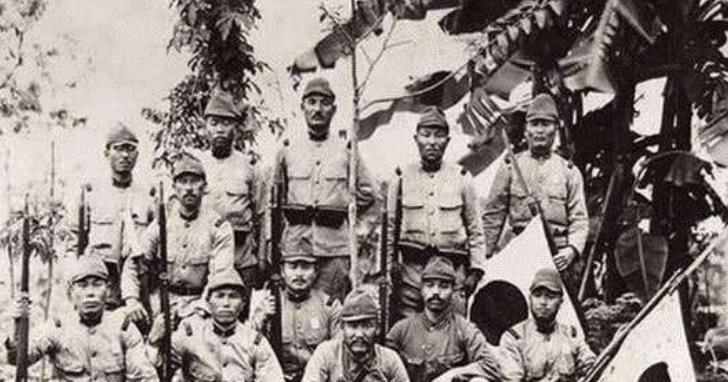"Spreading rumors with a mouth, refuting rumors and running and breaking legs", the story of "at the end of World War II, a Japanese army with a scale of about a thousand people was wiped out by crocodiles" was spread for a long time. Although the little devils who are difficult to read and indignant, the bones of the crocodiles are incomplete, and the content is extremely comfortable, the so-called "Myanmar crocodile incident" is artificially exaggerated, and it has become a "crocodile cannibalism incident recorded in the Guinness Book of World Records" written by the author of the online article.
The story takes place on The 2,300-square-kilometer island of Langley, Myanmar's largest island, located on the eastern shore of the Bay of Bengal, just 30 kilometers from the nearest point on the mainland. As early as the outbreak of the Pacific War, the Japanese army occupied this area and stationed it to build fortifications.

Ghost Soldier
In early 1945, Mountbatten, then commander-in-chief of the Allied forces in the Southeast Asian Theater, began to plan a counter-offensive against Burma, and Langley Island, which was flat and suitable for the construction of an airfield, bore the brunt of the allied targets. The ghost stationed on the island at this time was the 121st Infantry Regiment (from Tottori) belonging to the 54th Division, with a total number of no more than 1,000 people, and its commander was Nagasawa Kanichi Daisa. The Allied forces (mainly commonwealth troops) supported by the Navy's large-caliber naval guns, against this Japanese army that lacked heavy weapons firepower and artillery support, were obviously killing chickens with cattle knives.
Japanese prisoners of war
In January 1945, a reconnaissance British military aircraft discovered a Japanese fortification on Langley Island. On 21 January, before the British landing forces launched an attack, the British fleet, led by the battleship Queen Elizabeth, shelled the reconnaissance target positions.
Large-caliber naval guns soon overthrew the Japanese fortifications, and the successful landing of the British drove the remaining Japanese troops out of their positions. Seeing that victory was hopeless, the Japanese troops guarding the island planned to cross Langley Island and retreat inland from the other end of the island. The fighting lasted until 22 February, when the Allies completely occupied Langley.
Landing operations
The so-called "Burmese crocodile incident" was a small episode that took place during the landing battle on Langley Island. A British soldier named Bruce Stanley Wright, who later became a naturalist and wrote a book called Wildlife Sketches Nearand Farr, which mentions an attack on retreating Japanese troops by a swarm of crocodiles perched in mangrove swamps on the night of February 19, 1945.
British Army
The story was constantly hyped and spread, eventually becoming the so-called "japanese troops of nearly a thousand people were wiped out by crocodiles", and was named "the largest casualty caused by crocodiles" and recorded in the Guinness Book of World Records. In fact, although there are many crocodiles in the mangrove swamps of Langley Island, there will not be as many as 10,000 or tens of thousands of them as rumored, and the number of organisms will not exceed the carrying capacity of the local environment.
Moreover, the total number of Japanese troops on the island was only 1,000, and the Allies killed 500 and took 20 prisoners, and the remaining Japanese troops fled to the inland areas, so how could the crocodiles eat more than a thousand devils?
alligator
Moreover, the Japanese army occupied Langley Island in 1942, and it was impossible to accidentally hit and break into the crocodile's nest. Moreover, this ghost was not a scattered army, but a retreat into an organization, and from time to time resisted the pursuit of the British army. Even if the retreating Japanese army encountered a crocodile ambush on the way, there were small casualties, and the modern army equipped with guns could still repel the crocodile siege. Although the crocodile's skin texture is hard, it cannot withstand the attacks of modern firearms.
Japanese machine gun positions
Neither the local people, nor the Japanese prisoners of war, nor the Allied officers and men who participated in the war, including the British war reports, did not mention the siege of the crocodile swarms when the Japanese army retreated. Moreover, the battle of Langley Island was not large, and the Japanese army did not put ships into the battle in this battle, so this Japanese army did not come from the sunk Japanese ships, but the island guard troops who were familiar with the local environment.
The truth of "crocodiles eating thousands of Japanese troops" should be that crocodiles smelled the blood on the battlefield, attacked and devoured the corpses of Japanese troops left on the battlefield and the Japanese soldiers and wounded who were left alone, not the eye-catching anecdotes that "it is said that at the end of World War II, a group of nearly a thousand Japanese troops was wiped out by crocodiles" and so on the Internet.